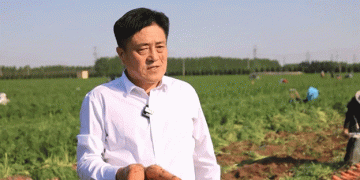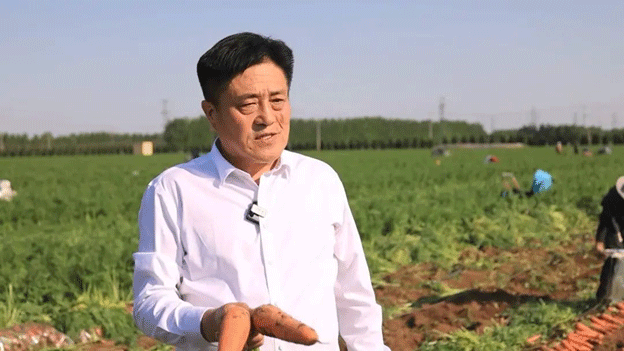China’s commitment to opening its economy has become a cornerstone of its modernization, and nowhere is this more evident than in Weifang, Shandong Province. As the nation’s first comprehensive agricultural open development pilot zone, Weifang is pioneering a model of agricultural modernization that combines innovation, global cooperation, and market-driven expansion.
One of the prime examples of this success is Weifang’s carrot production. The region’s carrot processing industry, particularly in the Shouguang area, boasts over 40 large processing enterprises, producing high-quality carrots for both domestic consumption and export. International buyers, such as Ali from Bangladesh, frequent the region to personally oversee shipments. The demand is so high that Ali has ordered 100 shipping containers of carrots, a testament to the product’s quality and reliability in supply.
Carrot production in Weifang has seen remarkable growth. Initially limited to a single fall harvest, local farmers have adapted by introducing a second spring crop, increasing their yield. Despite this, demand continues to outpace supply, underscoring the high market potential for this crop. This expansion is not limited to local fields. Weifang’s carrot-growing operations now span over 100 bases across China, covering different latitudes to ensure year-round production. By taking advantage of different climate zones, Weifang’s agricultural enterprises have achieved continuous supply to global markets, a feat that has seen carrot production increase from 20,000 to 150,000 acres.
In terms of output, Weifang’s carrot yield has skyrocketed. Where farmers once produced 3,000–4,000 kilograms per acre, today’s yields reach 12,000–15,000 kilograms per acre, thanks to advanced agricultural techniques and technology. This productivity is among the highest in the world, putting Weifang at the forefront of global carrot production. Exports from this region now account for over 60% of China’s total carrot exports, reaching more than 20 countries and generating an annual revenue exceeding 2 billion RMB.
Weifang’s success in carrot production is part of a larger trend. Over 700 agricultural export companies operate in the region, shipping products to 141 countries. Weifang is responsible for one-eighth of China’s vegetable exports and one-sixth of its poultry export value, with total agricultural exports exceeding 10 billion RMB for five consecutive years. This impressive growth is backed by a robust agricultural supply chain, with Weifang leading the nation in the development of advanced seed technologies, greenhouses, and smart farming practices.
Innovative Solutions and Global Outreach
Weifang is not just content with local success; it actively seeks to expand its influence on a global scale. The city’s “go global” strategy has resulted in the establishment of 217 agricultural parks in 22 countries, with 73 local enterprises working abroad. These efforts are supported by over 10,000 agricultural technicians who provide guidance both domestically and internationally. A recent visit by an Angolan delegation to Weifang highlights this international outreach. Angolan officials praised the high level of automation and product quality in Weifang’s agricultural sector, strengthening ties for future cooperation.
One of the key players in Weifang’s international expansion is Shandong Kesheng Agricultural Technology Co., Ltd., which has been operating in Africa for 14 years. The company specializes in crop protection and has recently registered in Angola. It plans to collaborate with Angola’s Ministry of Agriculture to develop tailored solutions for the country’s pest and disease challenges, demonstrating how Weifang’s agricultural expertise can address global agricultural needs.
Driving Future Growth Through Innovation and Cooperation
The future of Weifang’s agricultural sector lies in its ability to continue innovating and forming strategic partnerships. The city has invested heavily in research and development, establishing platforms like the Peking University Modern Agriculture Research Institute and 38 agricultural academician workstations. Weifang has also built over 200 smart farms and livestock operations, demonstrating how digital agriculture is reshaping traditional farming methods. The city’s commitment to technological advancement was further highlighted at the recent China–Latin America and Caribbean Agricultural Ministers Forum, which generated over 1.3 billion RMB in cooperation agreements.
By combining local expertise with international cooperation, Weifang is setting a new standard for agricultural modernization. The city’s ability to adapt to market demands, utilize cutting-edge technologies, and expand its global reach ensures that it will continue to be a leader in both domestic and international agricultural markets.
Weifang’s rapid modernization of its agricultural sector is a testament to the power of open economies, technological innovation, and strategic global partnerships. By expanding its production capabilities and reaching new international markets, Weifang has not only secured its place as a key player in global agriculture but also provided a model for other regions aiming to modernize and scale their agricultural operations.































